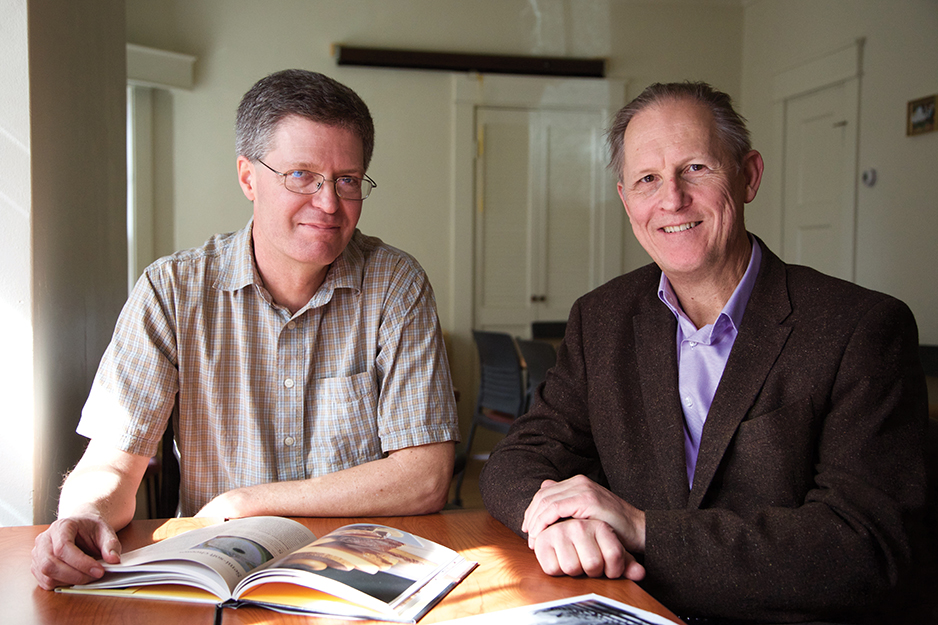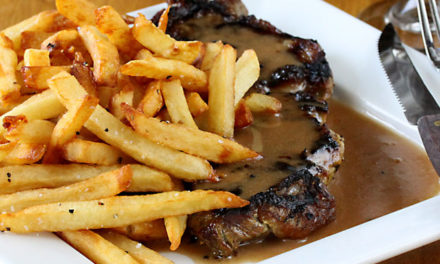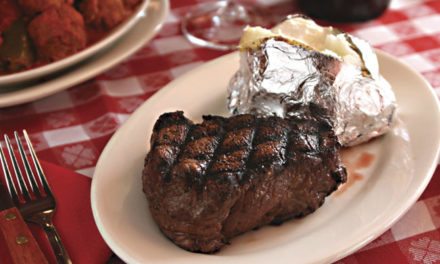
Peter Todd (left) and Carl Ipsen (right), two of the three IU Food Institute co-directors. Photo by Jim Krause
BY STEPHANIE VON HIRSCHBERG
Choosing which foods to buy and eat has become an increasingly complex decision. Should you banish sugar-laden soda from your diet? How do you know whether a food has been produced under fair, humane, and environmentally sound conditions? At the newly launched Indiana University Food Institute, questions like these are sparking vigorous debate and scientific inquiry. The Food Institute aims “to bring together the many people across the campus and Bloomington community who are interested in food and studying food,” says institute co-director Peter Todd. “We want to give them opportunities to share their ideas, energies, and efforts.”
Located in a revamped, two-family home at 405 N. Park Ave. (dubbed “The Food House”), the Food Institute is the culmination of work begun at the university more than a decade ago. By 2007, the department of anthropology had a doctoral program in food studies, and interest in food-related topics on campus had surged. Todd, a professor of cognitive science, psychology, and informatics, and Richard Wilk, anthropology professor and Food Institute co-director, saw an opportunity.
With a grant from IU’s Office of Sustainability, they organized a series of public seminars on food choice, freedom, and politics. The talks attracted overflow crowds, and scholars and students from fields as divergent as religious studies, geography, and ethnomusicology. “That gave us the first inkling of how widespread interest in food was,” says Todd. The success of the year-long seminar lead to IU’s 2014 themester, Eat, Drink, Think: Food from Art to Science.
IU now has about 50 faculty members with food-related expertise. Last year, history professor Carl Ipsen, founder and director of IU’s Food Project (now officially designated as The Food Institute’s “propaganda wing”) and the Food Institute’s third co-director, introduced a 24-credit undergraduate certificate in food studies. The program features courses from many different disciplines, including Food, Peace, and War (through the department of geography) and Farming the City: Global Perspectives on Urban Agriculture & Food Security (through the School of Public and Environmental Affairs).
A keystone of the certificate is Edible Education 101, a semester-long presentation that is open to the public. Indeed, the Food Institute’s goal is not only to support research and the many student food clubs, but also to engage Bloomington’s farmers, vendors, restaurateurs, and other members of the food community. The course is a hybrid that combines readings, film, online lectures, and discussion. Introduced and led by Ipsen, the course is the product of a partnership between Alice Waters, founder of Chez Panisse and the Edible Schoolyard Project, and the University of California, Berkeley. The IU version incorporates online lectures from the UC Berkeley course with material from other sources and occasional guest appearances.
Events this spring included a public lecture by Waters on April 6 and an online conversation (from 2015) between food writer Mark Bittman and activist and scholar Raj Patel on April 11. Bloomington foodies also had opportunities to learn about food issues through the Food Institute’s Speaker Series. On April 13, for example, Annie Corrigan discussed her book, Earth Eats: Real Food Green Living (IU Press).
For more information, visit foodinst.indiana.edu.














